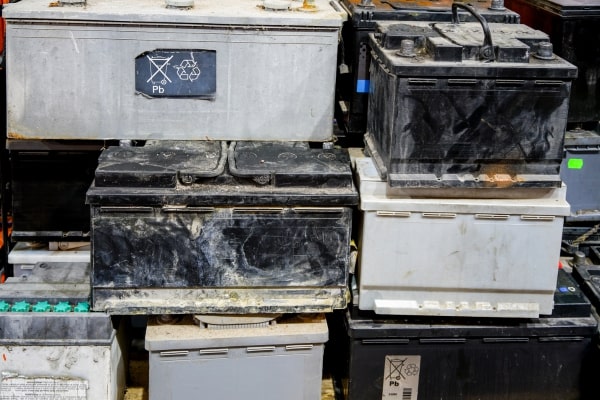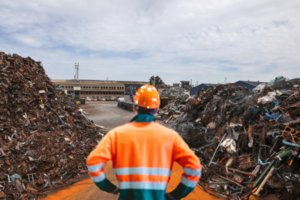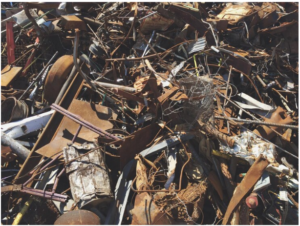Introduction
The recycling of lead acid batteries is an essential procedure that greatly contributes to environmental sustainability and the preservation of resources. As we navigate the realms of modern technology and renewable energy sources, one often-overlooked yet crucial component silently powers our everyday lives: lead acid batteries.
These unassuming powerhouses store and deliver energy in a wide array of devices, from cars to backup power systems. However, what happens when these batteries reach the end of their useful life? Enter lead acid battery recycling—a process that not only addresses environmental concerns but also holds the key to sustainable resource management.
In a world where electronic waste is rapidly growing, understanding the significance of lead acid battery recycling is paramount for both our planet’s health and our own future well-being. As the demand for energy storage solutions continues to rise, the importance of recycling lead acid batteries cannot be overstated. In this article, we will explore ten key reasons why lead acid battery recycling is essential for our planet’s well-being.
The Importance Of Lead Acid Battery Recycling
1. Environmental Protection:
Lead acid batteries are known to contain hazardous materials, including lead and sulfuric acid. Improper disposal of these batteries can pose a threat to the environment by releasing toxic substances such as lead into the soil and water. Recycling lead acid batteries is crucial in preventing environmental pollution as it allows for the safe extraction and disposal of these harmful chemicals.
Through recycling, the hazardous materials can be properly managed, reducing the risk of contamination and harm to ecosystems. Proper recycling practices help to protect natural resources and minimize the impact of toxic substances on wildlife and human health. It is essential for individuals and businesses to responsibly recycle their lead acid batteries to safeguard the environment for future generations.
2. Resource Conservation:
Lead acid battery recycling is an essential part of resource conservation efforts. Lead, a finite resource, is extracted through environmentally damaging mining processes. By recycling lead acid batteries, we can recover and reuse this valuable metal, reducing the need for new mining activities and minimizing environmental impacts.
In addition to lead, recycling also conserves resources like plastic and sulfuric acid used in battery production. This sustainable practice not only helps in preserving natural resources but also reduces waste going into landfills. Overall, lead acid battery recycling plays a crucial role in promoting a circular economy and minimizing the negative consequences of resource extraction.
3. Energy Efficiency:
Lead acid battery recycling is an energy-efficient process that consumes less energy than manufacturing new batteries from raw materials. Recycling facilities utilize advanced technologies to efficiently extract valuable materials such as lead, sulfuric acid, and plastic components. This not only reduces energy consumption but also lowers greenhouse gas emissions associated with the production of new batteries. By reusing these extracted materials, the need for extracting and processing virgin resources is minimized, contributing to resource conservation efforts.
4. Reduction of Landfill Waste:
Lead acid batteries, if not properly disposed of, contribute to hazardous waste in landfills. These batteries have a slow decomposition rate, taking hundreds of years to break down completely. Their toxic components can pose serious environmental threats over the long term. However, through recycling programs for lead acid batteries, we can prevent them from ending up in landfills and reduce the amount of hazardous waste produced.
Recycling these batteries helps to recover valuable materials like lead and plastic for reuse in new products. Additionally, it decreases the need for raw materials extraction and minimizes energy consumption in manufacturing processes. Proper disposal practices ensure that these toxic chemicals are managed responsibly while also promoting a circular economy approach towards resource conservation.
By participating in lead acid battery recycling initiatives, individuals and businesses can play a significant role in reducing landfill waste and protecting the environment for future generations.
5. Prevention of Lead Poisoning:
Lead poisoning is a serious health concern caused by exposure to highly toxic lead. One common source of lead contamination is improper handling or disposal of lead acid batteries. When these batteries are not recycled properly, lead can seep out and contaminate soil and water sources, posing a risk to ecosystems and public health.
Recycling lead acid batteries prevents this contamination by safely extracting the lead and ensuring its proper disposal or reuse. By separating and treating the lead in a controlled manner, the risk of environmental and human exposure to this harmful substance is minimized. Proper battery recycling practices play a crucial role in preventing lead poisoning incidents and protecting both wildlife and communities from the harmful effects of lead contamination.
6. Compliance with Regulations:
Compliance with regulations is crucial when it comes to the disposal and recycling of lead acid batteries. Different countries have strict rules in place to govern how these batteries should be handled to prevent environmental damage. By following these regulations, companies can avoid legal repercussions and help protect the environment from harmful pollutants.
Lead acid battery recycling facilities are specifically designed to handle these types of batteries according to local laws. These facilities have the necessary equipment and expertise to ensure responsible waste management practices are followed. Recycling lead acid batteries not only helps adhere to regulations but also promotes sustainability by reusing valuable materials.
Overall, compliance with regulations regarding lead acid battery recycling is a fundamental aspect of responsible waste management that benefits both business operations and the environment.
7. Creation of Job Opportunities:
The lead acid battery recycling industry plays a crucial role in job creation. Various stages of the recycling process, such as collection, transportation, sorting, and processing, require a skilled workforce. Recycling facilities provide employment opportunities for individuals across different levels of expertise. By supporting these initiatives, we can stimulate economic growth in our communities.
Investing in battery recycling not only benefits the environment but also contributes to the local economy through job creation. Overall, the lead acid battery recycling industry serves as a source of sustainable employment and economic development.
8. Reduction of Greenhouse Gas Emissions:
Lead acid battery recycling plays a crucial role in reducing greenhouse gas emissions associated with their production. The production process of lead acid batteries involves energy-intensive methods that release greenhouse gases into the atmosphere. By recycling these batteries, we can significantly decrease the environmental impact caused by their manufacturing. In addition to lowering greenhouse gas emissions, recycling also prevents the release of toxic gases that would occur if batteries were incinerated or left in landfills.
Overall, lead acid battery recycling helps mitigate both environmental and health hazards linked to their disposal.
9. Promotion of Circular Economy:
Lead acid battery recycling is a significant example of implementing circular economy principles. Rather than the traditional linear model of extraction, use, and disposal, recycling ensures valuable materials are recovered and reused. This process helps minimize the need for new resources by incorporating recycled materials into new battery production.
By adopting lead acid battery recycling practices, businesses can contribute to sustainability efforts and reduce environmental impact. The reuse of materials not only conserves resources but also minimizes waste generation. Through this closed-loop system, we can effectively manage resources and promote a more sustainable approach to manufacturing batteries.
Overall, lead acid battery recycling plays a vital role in reducing reliance on virgin resources while promoting a more environmentally friendly production process. It showcases how circular economy concepts can be successfully implemented in industrial practices.
10. Contribution to Sustainable Development Goals:
Lead acid battery recycling plays a crucial role in advancing several United Nations Sustainable Development Goals (SDGs). These goals encompass areas such as responsible consumption and production, climate action, clean water and sanitation, and decent work and economic growth. By engaging in lead acid battery recycling initiatives, we can support sustainable practices that align with these global targets.
Recycling batteries helps reduce waste generation, lower greenhouse gas emissions, prevent harmful chemicals from seeping into water sources, and create employment opportunities within the recycling industry. Overall, by actively participating in lead acid battery recycling efforts, we are making a tangible contribution towards the achievement of these important sustainability goals.
Conclusion
Lead acid battery recycling plays a vital role in protecting the environment, conserving resources, and promoting sustainability. Recycling helps prevent pollution, saves valuable materials, lowers greenhouse gas emissions, and boosts job creation. Individuals, businesses, and governments must collaborate to support and advance recycling efforts for lead acid batteries.
Through proactive measures, we can work towards a cleaner and healthier future for our planet.




